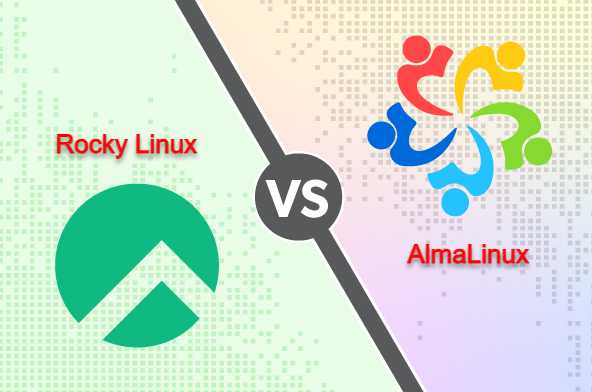
When it comes to selecting a server OS or an open-source OS for your infrastructure, Debian, CentOS, and RedHat are often the go-to choices. However, the open-source landscape offers more alternatives, and two notable options are Rocky Linux and AlmaLinux. Both these distributions share similarities with Red Hat Enterprise Linux (RHEL), particularly regarding stability and compatibility.
In this comprehensive comparison of AlmaLinux vs Rocky Linux, we will delve into key aspects to help you make an informed decision for your projects.
AlmaLinux vs Rocky Linux: Introductions
AlmaLinux
AlmaLinux, originating from CloudLinux’s RHEL derivative, was released in 2021. Initially known as Project Lenix, it was tailored for hosting providers and data centers. Despite CloudLinux’s significant role in AlmaLinux’s development, the OS foundation operates independently.
Rocky Linux
Rocky Linux, another enterprise-grade OS based on RHEL’s source code, was initiated in 2021. Designed by Gregory Kurtzer, the creator of CentOS, it aims to replace CentOS and maintains binary compatibility with RHEL.
AlmaLinux vs. Rocky Linux: The Main Differences
Updates and Release Cycle
Both distributions prioritize reliability over recency, making them solid choices for large enterprise environments. AlmaLinux historically adopts features faster, whereas Rocky Linux takes more time to evaluate and incorporate stable versions. Both have similar release and update cycles, minimizing the lag between RHEL and the forks.
Supported Architecture
AlmaLinux and Rocky Linux are 1:1 binary compatible RHEL forks, supporting x86_64, aarch64, ppc64le, and s390x architectures. AlmaLinux added s390x support in the most recent version, while Rocky Linux supported aarch64 from the start, with ppc64le and s390x added in version 9.x.
Also Read: How to Install Laravel on Ubuntu 18.04 with Apache
RHEL-Rebuild Experience
Rocky Linux’s team boasts extensive experience in rebuilding RHEL, while the AlmaLinux team, with CloudLinux’s background, has over ten years of experience rebuilding CentOS.
Stability
Both AlmaLinux and Rocky Linux excel in stability, inheriting the production-ready packages from CentOS’s rolling release. The downside is a delay in adopting the latest features to ensure stability.
Performance
With both distributions based on kernel version 5.14, performance differences are challenging to identify. Variations may arise from support for specialized packages and libraries.
Support
Despite compatibility with RHEL, some enterprise software may face challenges on AlmaLinux and Rocky Linux. Both communities actively contribute, with increasing user bases.
Community
Active communities for both distributions discuss upcoming versions, security updates, and features. The growing user base signifies expanding and engaging communities.
Package Managers
AlmaLinux uses dnf as the default package manager, emphasizing a “cutting-edge” approach. Rocky Linux sticks to the traditional RPM, aligning with other RHEL distros.
Security
Both distributions ensure security through their RHEL roots. AlmaLinux allows customizable security with the CIS Benchmark, while Rocky Linux uses SELinux for Mandatory Access Control.
Conclusion
AlmaLinux and Rocky Linux, emerging after CentOS’s end-of-life, target enterprise-level projects. AlmaLinux, backed by CloudLinux, aligns with RHEL and has prominent supporters like Microsoft and AWS. Rocky Linux, initiated by Gregory Kurtzer and with CIQ’s backing, positions itself as an alternative to CentOS and RHEL.
In conclusion, both AlmaLinux and Rocky Linux offer promising options for enterprise environments. The choice depends on specific needs, familiarity with the RHEL ecosystem, and preferences. Evaluate the key points provided and consider your requirements to make an informed decision for your projects.
For more details and support, feel free to explore the vibrant communities of both distributions. Choosing between AlmaLinux and Rocky Linux ensures you get a stable, secure, and reliable Linux distribution for your enterprise needs.
